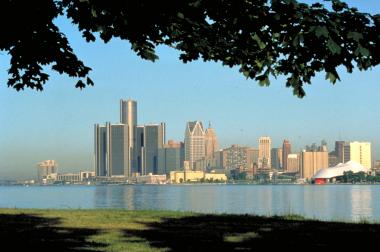
In recent days the Detroit Water and Sewerage Department, often working through independent contractors, has started cutting off service to up to 120,000 delinquent citizens, while giving a pass to major corporate laggards. The Great Recession has crushed the people of Detroit, with unemployment rates soaring as high as 35 percent in this period. At the end of 2013, 47 percent of the mortgages were still under water. They simply cannot pay. How could such draconian measures be justified?
To help and learn more, check out the Detroit Water Brigade here.
The state-local governmental factors in the Detroit bankruptcy have been a troubling aspect of this sad episode, especially since it has further burdened the 700,000 citizens of a city of that suffered almost 100,000 foreclosures in the Great Recession. The governor and legislative majority are conservatives, swept in with the 2010 election, while progressive African-American and union-friendly political leaders have traditionally controlled the city government. The state government moved to adopt laws to take over financially troubles cities with governor-appointed “Emergency Financial Managers” wielding extraordinary powers, and Detroit fell victim to this in early 2014. It does not require even mild cynicism to suspect that Detroit was the target of the new law from the outset.
There is no doubt that Detroit was under severe financial stress, but the Emergency Manager takeover and the subsequent bankruptcy took the fate of the city out of the hands of the people and placed it in the hands of the governor’s appointee and a federal judge, sacrificing democratic principles in the process. Fortunately, the bankruptcy judge has resisted the Emergency Manager’s moves to alter the fundamental character of city governance on a few key points, but the concern remains: what are the deep political motivations of the governor and the legislature and how might these harm the people of Detroit?
As mundane as it might sound, the Detroit Water and Sewerage system may be at the core of the Governor’s strategic plan. Water and water quality is a huge deal in Detroit. One of the city’s most important strengths is that it is located on the Great Lakes, a critical waterway which represents 95 percent of the surface fresh water of North America. The lakes are going through concerning changes from depletion and climate change, not to mention the threats from business activities such as hydraulic fracturing and oil pipelines within the watershed that could further damage the lakes that were abused by industrialization for more than a century.
But why would Detroit, whose population has shrunk to 700,000, matter so much? The answer is that the Detroit Water and Sewerage system serves a huge population, about 4 million, more than 40 percent of Michigan’s population. A city department runs it, but its reach is very broad. It is a large and solvent enterprise with about $5.8 billion of debt outstanding and funded by user charges from all of its constituents.
From the beginning, the Emergency Manager misconstrued the nature of the system and sought to pull it into the bankruptcy proceedings. When he listed the city’s debt, he included the entire $5.8 billion of system debt. This inflated the headline number for city indebtedness—$18 billion in total. He did this even though the city government was not obligated to pay the Water and Sewerage debt and city residents represented only a small fraction of the total rate base. This simply did not make sense financially. Nonetheless, it pumped up the headline number, which of course made conditions seem more severe and justified his appointment and the bankruptcy. But there were other reasons to fudge the facts. It drew the Water and Sewerage enterprise into the Detroit insolvency.
In his earliest submissions to the bankruptcy court, the Emergency Manager proposed a complete restructuring of the Water and Sewerage system, not bothering to say how this was crucial to the City’s budget problems. The management of the system would be transferred to a new board that would include appointees by the governor and would effectively come under his influence. The new board would consider privatization of large elements of the system and the system’s work force would be beaten down by salary and benefit cuts. The governor and legislature would score a victory over the public employee unions by damaging their members. And just think of all the useful relationships that the governor could develop if he could influence the award of huge privatization contracts.
This would, of course, be good for the governor’s party in state-wide elections, not to mention its prospects in the national elections of 2016. It might just serve wider political interests if it were to alter the critical debates over the Midwest watershed as fracking and oil and gas transmission from Canada confront environmental issues.
If these are part of the strategy for the Detroit Water and Sewerage system, it is even more tragic that the first step is to cut off basic services to households that simply cannot afford to pay for water.
Originally published at Demos.org.

